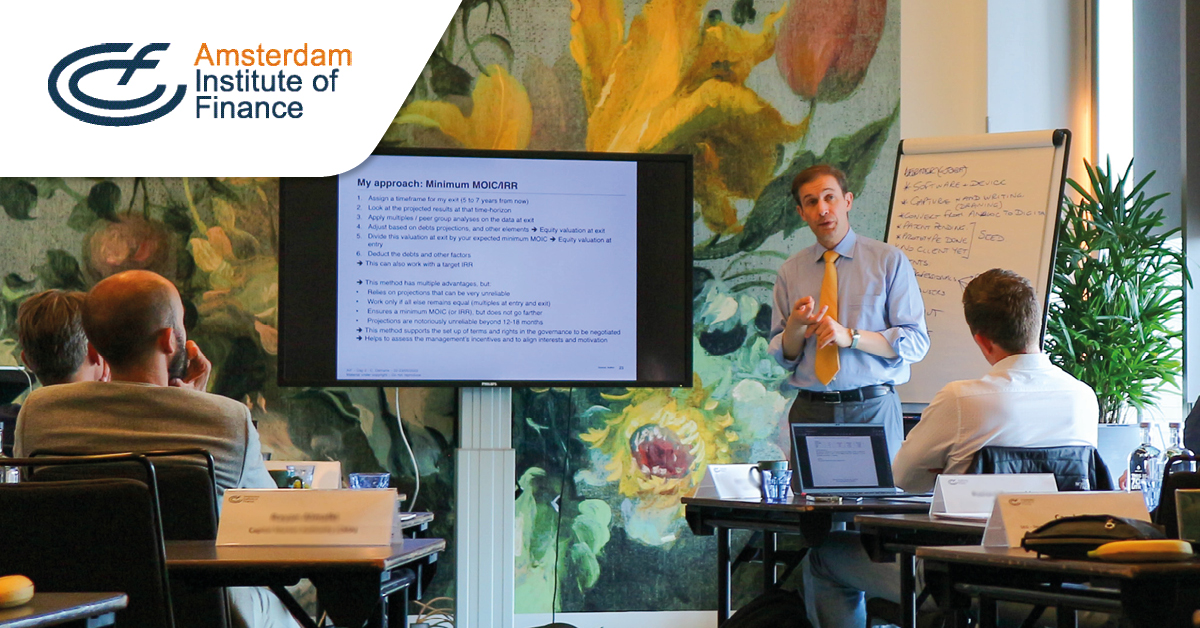
Professor Cyril Demaria, an experienced investor, shares invaluable lessons from his multi-decade career through his program on Entrepreneurial Finance: Venture Capital Financing. A view from the classroom:
On the road from a good idea to a thriving business, capital from external investors is essential. But as an investor, how do you know exactly what a company needs and how do you choose the right investments to grow your capital? This crucial question takes center stage in the Entrepreneurial Finance program at the Amsterdam Institute of Finance. The bankers, employees of investment funds and subsidizing government bodies who form the core of the participant group are introduced to this fine art by Prof. Cyril Demaria. As a former chief investment officer of UBS, he has seen his fair share of business cases; now Demaria works as an independent consultant for investors and is involved in some funds himself. He additionally shares his experiences at various business schools and in several books. The program material (in the form of business cases) also largely comes from Demaria’s personal archive.

Plans
The primary way investors and entrepreneurs communicate is through business plans. The entrepreneurs come up with a great plan for a new product or service, replete with all kinds of figures about the market and the promise of great financial returns. As an investor, the work then begins to screen these plans. In the first place, of course, it must be a good new product or service, but that goes without saying. Subsequently, all financial claims must be vetted. The other assumptions in the business plan are then tested: have the right KPIs been identified, are the market scans correct and are the timelines doable? The people are also very important: does the company have sufficient capacity to implement the plan? Once all plans, capacities, and timelines are listed, a clear understanding emerges of the funding needed to navigate the upcoming period – please note: that is not always the same amount as the entrepreneur asks for!
Teams
It is difficult to make concrete valuations for yet to be implemented business models or companies without a year-on-year track record. What is possible, however, is to estimate the capabilities of the entrepreneurs involved and their management teams. Demaria therefore believes that people are number one when estimating investment opportunities. It should be noted that in the entrepreneurial culture there is sometimes a tendency to use the credo ‘fake it till you make it’; another thing that Demaria warns about: he showed a case in which a recent graduate with no significant work experience calls himself an ‘experienced CFO’. Buyer beware!
“Find the balance between commitment and control.”
Professor Cyril Demaria, EDHEC Business School
Yet understanding a business case is only half the job: after all, the content of the investment agreement still needs to be negotiated. To train this skill as well and to familiarize the participants with the ins and outs of a ‘term sheet’ with agreements on a venture capital investment, Daan Wilms Van Kersbergen, Investment Director at Yield Lab, was invited to give a negotiation workshop based on a serious game that he has developed. The game clearly showed what entrepreneurial finance is all about, namely achieving a good balance between committed capital and control. Giving away too much money without control is a bad strategy, but endlessly demanding more control over a company in exchange for relatively little money also ensures that the entrepreneur pushes his chair back at the negotiating table and seeks out another investor. And it worked: the game environment triggered the competitiveness in the participants and people wanted to win the game.
“Give me your worst-case scenario, and that will be my most optimistic prediction”
Entrepreneurial finance, after all, is the art of finding a balance between optimism and skepticism. Where entrepreneurs like to burst with charm and with beautiful growth forecasts that take to the sky like a ‘hockey stick’, investors ask the difficult questions: whether, how and when these vistas will be realized. The amusing nature of the entrepreneur-investor relationship was summed up nicely during the course in the one-liner “give me your worst-case scenario, and that will be my most optimistic prediction.”
Networking opportunities
By intensively examining cases in groups with like-minded professionals, the program participants learn from and with each other. During the lunches and drinks around the program there is also the opportunity to get to know each other better. The location of the program, DoubleTree by Hilton near Amsterdam Central Station, is the perfect springboard for further exploring the city. Moreover, participating in the program also grants access to the AIF’s alumni network, connecting them with hundreds of investment professionals in the Netherlands and worldwide.
Learn how to invest in new ventures and raise funds for startups. Join the challenging 2-day Entrepreneurial Finance: Venture Capital Financing program by Prof. Cyril Demaria at Amsterdam Institute of Finance. Learn more & reserve your place here.